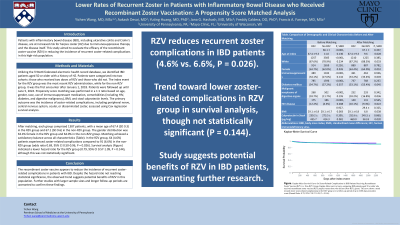Monday Poster Session
Category: IBD
P2550 - Lower Rates of Recurrent Herpes Zoster Complications in Patients With Inflammatory Bowel Disease Who Received Recombinant Zoster Vaccination: A Propensity Score Matched Analysis
Monday, October 28, 2024
10:30 AM - 4:00 PM ET
Location: Exhibit Hall E

Has Audio

Yichen Wang, MD
University of Pennsylvania
Philadelphia, PA
Presenting Author(s)
Yichen Wang, MD1, Aakash Desai, MD2, Yuting Huang, MBBS, PhD3, Jana G. Hashash, MD, MSc3, Freddy Caldera, DO, PhD4, Francis A. Farraye, MD, MSc3
1University of Pennsylvania, Philadelphia, PA; 2Mayo Clinic, Pittsburgh, PA; 3Mayo Clinic, Jacksonville, FL; 4University of Wisconsin School of Medicine and Public Health, MIddleton, WI
Introduction: Patients with inflammatory bowel disease (IBD) are at an increased risk for herpes zoster (HZ) due their underlying disease and drug-associated immunosuppression. This study aimed to evaluate the efficacy of the recombinant zoster vaccine (RZV) in reducing the incidence of recurrent zoster-related complications in this high-risk population.
Methods: Utilizing TriNetX, a multi-institutional US database, we identified patients with IBD aged 50 or older with a previous history of HZ. Patients were categorized into two cohorts: those who subsequently received two doses of RZV and those who did not. The index event for the RZV group was the most recent RZV administration, while for the non-RZV group, it was the first encounter after January 1, 2018. Patients were followed up until June 5, 2024. Propensity score matching was performed in a 1:1 ratio based on age, gender, race, use of immunosuppressant medication, comorbidities (including HIV, diabetes, and digestive malignancy), BMI, and stool calprotectin levels. The primary outcome was the incidence of zoster-related complications, including peripheral nerve, central nervous system, ocular, or disseminated zoster, assessed using Cox regression survival analysis.
Results: After matching, each group comprised 1387 patients, with a mean age of 67.4 (SD 9.3) in the RZV group and 67.1 (SD 9.6) in the non-RZV group. The gender distribution was 63.4% female in the RZV group and 64.0% in the non-RZV group. Matching achieved a satisfactory balance across all characteristics (Table). In the RZV group, 64 (4.6%) patients experienced zoster-related complications compared to 91 (6.6%) in the non-RZV group (odds ratio 0.69, 95% CI 0.50-0.96, P = 0.026).
Discussion: Administration of RZV after a previous episode of HZ significantly reduces the incidence of recurrent zoster-related complications in patients with inflammatory bowel disease. These findings support the routine use of RZV in patients with and without a previous history of HZ to mitigate the burden of herpes zoster and its complications.
Note: The table for this abstract can be viewed in the ePoster Gallery section of the ACG 2024 ePoster Site or in The American Journal of Gastroenterology's abstract supplement issue, both of which will be available starting October 27, 2024.
Disclosures:
Yichen Wang, MD1, Aakash Desai, MD2, Yuting Huang, MBBS, PhD3, Jana G. Hashash, MD, MSc3, Freddy Caldera, DO, PhD4, Francis A. Farraye, MD, MSc3. P2550 - Lower Rates of Recurrent Herpes Zoster Complications in Patients With Inflammatory Bowel Disease Who Received Recombinant Zoster Vaccination: A Propensity Score Matched Analysis, ACG 2024 Annual Scientific Meeting Abstracts. Philadelphia, PA: American College of Gastroenterology.
1University of Pennsylvania, Philadelphia, PA; 2Mayo Clinic, Pittsburgh, PA; 3Mayo Clinic, Jacksonville, FL; 4University of Wisconsin School of Medicine and Public Health, MIddleton, WI
Introduction: Patients with inflammatory bowel disease (IBD) are at an increased risk for herpes zoster (HZ) due their underlying disease and drug-associated immunosuppression. This study aimed to evaluate the efficacy of the recombinant zoster vaccine (RZV) in reducing the incidence of recurrent zoster-related complications in this high-risk population.
Methods: Utilizing TriNetX, a multi-institutional US database, we identified patients with IBD aged 50 or older with a previous history of HZ. Patients were categorized into two cohorts: those who subsequently received two doses of RZV and those who did not. The index event for the RZV group was the most recent RZV administration, while for the non-RZV group, it was the first encounter after January 1, 2018. Patients were followed up until June 5, 2024. Propensity score matching was performed in a 1:1 ratio based on age, gender, race, use of immunosuppressant medication, comorbidities (including HIV, diabetes, and digestive malignancy), BMI, and stool calprotectin levels. The primary outcome was the incidence of zoster-related complications, including peripheral nerve, central nervous system, ocular, or disseminated zoster, assessed using Cox regression survival analysis.
Results: After matching, each group comprised 1387 patients, with a mean age of 67.4 (SD 9.3) in the RZV group and 67.1 (SD 9.6) in the non-RZV group. The gender distribution was 63.4% female in the RZV group and 64.0% in the non-RZV group. Matching achieved a satisfactory balance across all characteristics (Table). In the RZV group, 64 (4.6%) patients experienced zoster-related complications compared to 91 (6.6%) in the non-RZV group (odds ratio 0.69, 95% CI 0.50-0.96, P = 0.026).
Discussion: Administration of RZV after a previous episode of HZ significantly reduces the incidence of recurrent zoster-related complications in patients with inflammatory bowel disease. These findings support the routine use of RZV in patients with and without a previous history of HZ to mitigate the burden of herpes zoster and its complications.
Note: The table for this abstract can be viewed in the ePoster Gallery section of the ACG 2024 ePoster Site or in The American Journal of Gastroenterology's abstract supplement issue, both of which will be available starting October 27, 2024.
Disclosures:
Yichen Wang indicated no relevant financial relationships.
Aakash Desai indicated no relevant financial relationships.
Yuting Huang indicated no relevant financial relationships.
Jana Hashash: Bristol Myers Squibb – Consultant.
Freddy Caldera: GSK – Consultant. GSK – Grant/Research Support. Janssen – Advisory Committee/Board Member. Janssen – Consultant. Novavax – Grant/Research Support.
Francis Farraye: AbbVie – Consultant. Avalo Therapeutics – Consultant. Bausch – Advisor or Review Panel Member. BMS – Consultant. Braintree Labs – Consultant. DSMB for Lilly. – Sits on. Fresenius Kabi – Consultant. GI Reviewers and IBD Educational Group – independent contractor. GSK, Iterative Health, Janssen, Pfizer, Pharmacosmos, Sandoz Immunology, Sebela and Viatris – Consultant.
Yichen Wang, MD1, Aakash Desai, MD2, Yuting Huang, MBBS, PhD3, Jana G. Hashash, MD, MSc3, Freddy Caldera, DO, PhD4, Francis A. Farraye, MD, MSc3. P2550 - Lower Rates of Recurrent Herpes Zoster Complications in Patients With Inflammatory Bowel Disease Who Received Recombinant Zoster Vaccination: A Propensity Score Matched Analysis, ACG 2024 Annual Scientific Meeting Abstracts. Philadelphia, PA: American College of Gastroenterology.
